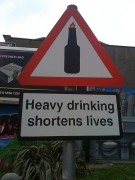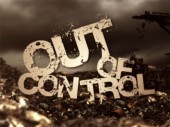Binge Drinking and Blackout Binge Eating
As an activist, I find research is an inspiration for a lot of my writing, and is important to share to show trends of research, treatment, prevention and to help create conversations on topics that need more awareness. When I saw the article called “Heavy Drinkers Have Poor Dietary Habits,” my first gut response was a resounding DUH. Not the most professional response, I know.
Binge Drinking and Poor Dietary Habits
The details of the study are simple, and summed up by Miguel A. Martinez-Gonzalez, chair of preventive medicine and Public Health at the University of Navarra “Excessive drinkers, either with or without binge drinking, showed a poor adherence to dietary recommendations.”
Alcohol Addiction and Eating Disorders
As an eating disorder activist, I always try to take this a step farther and show the connection between eating disorders and substance abuse and addictive behaviors. I think this study is important to show that disordered eating behavior surrounds drinking. Alcohol is such a normalized behavior during meal times, during holidays, and we often hear about the benefits of moderate daily drinking. However, when people binge drink, the effects on the health of a person is greater than merely the alcohols on the body, because it impedes and alters peoples’ behavior and healthy eating.
My Binge Drinking
I haven’t often shared the specifics of my experiences with drinking and disordered eating, and what developed into an alcohol addiction and several eating disorders. College was the beginning of the path from binge drinking to alcohol addiction. In college I also developed my eating disorder for the first time.
I would binge drink after restricting meals during the days of the nights I was planning to binge drink. Why would I do this? My main reason for the restriction of food was so I would feel the full effects of alcohol and not have to drink as much. I can speculate and say this was the beginning of my unhealthy behaviors around food and alcohol. My intention was not to be thin. It was to get drunker faster and harder.
I never got the idea from others that I should restrict, but binge drinking in the college setting is so normalized and can be very dangerous for young people who have limited experience drinking. I never learned to moderately drink; it was like a floodgate into the spiral towards toxic behavior. I loved being drunk, I felt confident, secure, and able to be the center of attention at parties. That kind of thinking was why it was so hard for so many years to get and stay sober.
Normalcy of Binge Drinking
When I left college I continued to binge drink and restrict food. What may seem like abnormal behavior to most was my sense of normal. That is hard to explain to people who have never been through struggles with substance abuse. Normal is relative, and my body got used to the state of lack of food and alcohol. I didn't feel like me unless I had a shot or five or ten in me.
I learned to get accustomed to blackouts. Whenever I binge drank, which was every time I drank, I would have periods of a blackout usually followed by passing out. During blackouts I would be able to walk, talk and function but would have no memory of it in the morning. A scary reality I somehow rationalized being normal and ok, when it was dangerous and put me in situations where my choices didn’t feel like they were my own, and could have led to my death or the death of others.
Blackout Binge Eating
I would wake up in the morning and never know how I got to bed, what had happened leading up to passing out, and would just let it go as a normal part of my life. The shame only came when I would go downstairs and find remnants of food everywhere, on the countertops, in drawers in the fridge. I would have blackout binge eating sessions, probably due to being starved from the day on top of cravings to eat high caloric, high fat items. I am not saying high calorie or high fat food is good or bad or has any moral value, I am just stating that my binges weren’t with healthy foods and as the study I referenced in the beginning, I would make poor health decisions.
These blackout binge eating sessions made me feel powerless and out of control and somehow never felt normal. I always wondered what the difference is between normal states in substance abuse and eating disorders and why we feel shame in some areas, and rationalize normalcy in others. Obviously my head wasn’t healthy, and I was struggling and felt I had no control over my life, my choices, or my behaviors. It has taken years to get to the place where I can say I blackout binge ate, and still is hard to say, even though I use my voice on a daily base. I somehow thought I couldn't control my drinking and that was OK, but it wasn't OK to lose control of my eating, especially when I had restricted and done that all day. All elements of control, and loss of control and none of it made any sense.
It was only in recovery that the rationalizations, the denials, the normalcy of my behaviors were stripped to the core. I saw the reality for the first time. I saw it wasn't a willpower issue, and that I had not chosen to be addicted or have an eating disorder. I had to shed the normalcy of negative behaviors, and I think addressing the normalization of binge drinking as a “phase” for college students especially, could potentially help address the binge drinking in this population.
Next is to de-stigmatize binge eating, and address the behaviors, lesson the shame, and help people seek help.
APA Reference
Sebelius, K.
(2011, August 25). Binge Drinking and Blackout Binge Eating, HealthyPlace. Retrieved
on 2026, March 3 from https://www.healthyplace.com/blogs/debunkingaddiction/2011/08/binge-drinking-and-blackout-binge-eating
Author: Kendra Sebelius
I got extensive therapy to work on building healthy coping skills and had to be brutally honest and find community (in whatever form that takes). I had to find says to manage the anxiety so it wouldn't become a full blown panic attack/spiral. You need to have patience with yourself, focus on the future, face you fears and struggles and be honest. You aren't alone.
I got extensive therapy to work on building healthy coping skills and had to be brutally honest and find community (in whatever form that takes). I had to find says to manage the anxiety so it wouldn't become a full blown panic attack/spiral. You need to have patience with yourself, focus on the future, face you fears and struggles and be honest. You aren't alone.
Hi,
How did you manage the issue and what kind of help did you receive that was successful?
Pretty element of content. I just stumbled upon your blog and in accession capital to claim that I acquire actually enjoyed account your blog posts.
Any way I'll be subscribing on your feeds and even I fulfillment you get admission to constantly quickly.
I am currently going through something very similar, I think it's linked to my long lingering depression/eating disorder. About a month after coming to university and not being very happy, I started getting black out drunk every night despite not greatly increasing the amount I drank. I thought I was having fun but then I started to worry it was a weird way of subconsciously dealing with my depression. Then the eating started. I had been eating 'well' aka not very much so I was quite proud of myself. So I barely ever bought 'bad' food, but my 9 other flatmates did. So in my black out drunk state, I started eating their food and not remembering it the next day. Pretty sure they all know it's me. I feel disgusting and I have no idea who to turn to, so just venting it all here haha.
Waking up in the morning and going into the kitchen is scary, I could just imagen what I look like Bing drunk eating, if it's anything like how my kitchen looks in the aftermath I am scared
Thank you for posting this. I am currently going through the same thing-blacking out and binge eating high fat foods, in particular nuts and peanut butter. What kind of help did you receive?